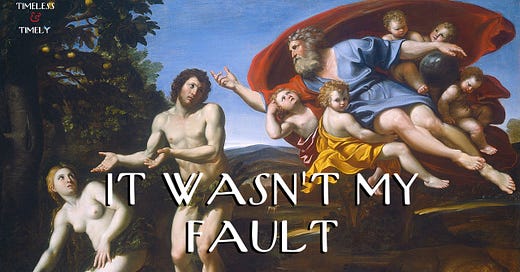
“A gentleman accepts the responsibility of his actions and bears the burden of their consequences, even when he did not himself instigate them but only acquiesced to them, didn't say No even though he knew he should.”
— William Faulker, 1962
When something goes wrong, what’s your immediate response?
To deny it even happened? To blame someone else? To completely reject your responsibility?
Or do you step up and take the heat, knowing that you may catch an earful, or even get fired?
It’s not always easy to do the right thing. I get it.
But it’s the job of a leader to do what’s right, even when its personally difficult to do. That’s called integrity.
Three Stories About Accepting Responsibility
Good leadership is, as the newsletter implies, timeless and timely. Historically we’ve routinely seen good leaders in military settings. These three stories all have a military thread.
The Inimitable Nimitz
Recently, the name of Admiral Chester W. Nimitz came back to me. His name is known to anyone who has a passing familiarity with the U.S. Navy; an entire class of ships is named after him.
Nimitz was a fleet admiral for the U.S. Navy and served as the commander of the Pacific fleet during World War II. As a young officer, he once ran his ship aground in the Philippines. This could have been a career-ending mistake, but instead, it became a defining moment.
Nimitz took full responsibility for the incident, demonstrating his integrity and leadership potential. His superiors recognized these qualities and gave him a second chance, which ultimately allowed him to rise through the ranks and become one of the most celebrated naval leaders in U.S. history.
Naval leaders receive their training at the U.S. Naval Academy, which houses the Nimitz Library. Earlier this month, the library removed nearly 400 books to adhere to Executive Order 14190.1
Leaders removed books on the Holocaust, histories of feminism, civil rights and racism, and even Maya Angelou’s memoir I Know Why the Caged Bird Sings.2
Books that remain:
The Camp of the Saints, a novel that envisions a takeover of the Western world by immigrants from developing countries
The Bell Curve, which argues that Black men and women are genetically less intelligent than white people. But a critique of the book was pulled.
Two copies of Mein Kampf.
And just last week, Ryan Holiday, a high-profile speaker on Stoicism and wisdom, had his planned speech at the Naval Academy canceled because he wouldn’t agree to not mention the book ban. He thought it was essential to make the point that “the pursuit of wisdom is impossible without engaging with (and challenging) uncomfortable ideas.”3
The leaders at the Naval Academy could have used that lecture. So much for integrity.
The Fault Is Mine Alone
Looking back now, we marvel at the accomplishment of D-Day and of the bravery of the men who fought and were wounded or killed there.
But on June 5, it was far from certain. General Dwight Eisenhower prepared a note (which he misprinted as July 5) in the event of a catastrophic loss that day:

“Our landings in the Cherbourg-Havre area have failed to gain a satisfactory foothold and I have withdrawn the troops. My decision to attack at this time and place was based on the best information available. The troops, the air and the Navy did all that bravery and devotion to duty could do. If any blame or fault attaches to the attempt it is mine alone.”
It was the largest military landing in history, and here was one man — one extraordinary leader — who was willing to take the blame if it failed. Without reservation.
The “blame or fault…is mine alone.”
I Don’t Blame Her a Bit
One morning in 2005, President George W. Bush was visiting soldiers at Walter Reed National Military Medical Center who were seriously wounded in Iraq and Afghanistan.
There were many touching moments that showed his humanity, but the most powerful one came when a mother of a dying soldier yelled at him, wanting to know why it was her child and not his who was in that hospital bed.
The president, rather than fleeing an uncomfortable scene, tried comforting the mother, then just stood there and absorbed her outburst.
Dana Perino, Bush’s deputy press secretary at the time, remembers the scene:4
Later, as we rode back on Marine One to the White House, no one spoke.
But as the helicopter took off, the president looked at me and said, “That mama sure was mad at me.” Then he turned to look out the window of the helicopter. “And I don’t blame her a bit.”
How simple it is to avoid responsibility. Deny your role. Shift the blame. Point fingers. Make it someone else’s problem to deal with.
True leaders know responsibility and integrity go hand in hand.
It’s why you routinely see people who have no integrity taking no responsibility.
Don’t be one of them.
There’s so much to learn,
Refer friends, earn free membership in the Ampersand Guild:
“Ending Radical Indoctrination in K-12 Schooling,” The White House, January 29, 2025
List of Removed Books from the Nimitz Library, Released April 4, 2025
“The Naval Academy Canceled My Lecture on Wisdom,” The New York Times, April 19, 2025.
“Why George W. Bush stood there and took the wrath of a soldier’s mom,” The Chicago Tribune, August 18, 2019







Owning mistakes today is a rarity. There's always someone or something else to point at and blame , whether true or not.
It has become an accepted plague on our society. It's also apolitical or bipartisan, though the fish rots from the head down.
Our ability to respond with integrity seems our highest response-ability. Good stories! Thanks.